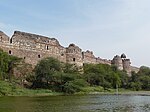Appu Ghar
1984 establishments in Delhi2008 disestablishments in IndiaAmusement parks closed in 2008Amusement parks in IndiaAmusement parks opened in 1984 ... and 5 more
Buildings and structures in DelhiDefunct amusement parksTourist attractions in DelhiUse Indian English from May 2018Water parks in India
Appu Ghar was an amusement park operated by International Amusement Limited, located in Pragati Maidan, New Delhi, India. It was spread over 15.5 acres (63,000 m2) of land and was India's first amusement park. It was established in 1984 to commemorate the 1982 Asian Games, and it was inaugurated on 19 November 1984 by then-Prime Minister of India, Rajiv Gandhi. The park closed down in 2008 after a legal ruling allocating the land for government use.
Excerpt from the Wikipedia article Appu Ghar (License: CC BY-SA 3.0, Authors).Appu Ghar
Delhi
Geographical coordinates (GPS) Address Nearby Places Show on map
Geographical coordinates (GPS)
| Latitude | Longitude |
|---|---|
| N 28.616813 ° | E 77.243359 ° |
Address
110503 Delhi
Delhi, India
Open on Google Maps







